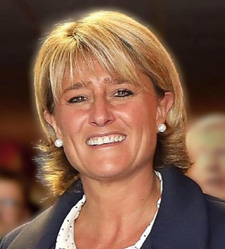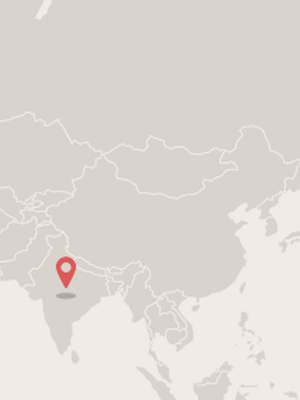 |  And what if we no longer had to walk to the end of the garden to make a call? And what if we no longer had to walk to the end of the garden to make a call?
The Government reached an historic agreement with operators, thanks to the wide-reaching collaborative work that Arcep performed over the course of several months. One of these measures has gone almost unnoticed: Wi-Fi calling and texting. Even though we are all well aware of the trope — and recurring complaint made against operators – of having head to the bottom of the garden in the pouring rain just to get a signal. While it is true that coverage in rural areas will improve considerably, indoor connectivity will sometimes remain spotty.
This is why this new agreement provides for ubiquitous indoor coverage thanks to the use of Wi-Fi calling. This means that, regardless of your operator, you will be able to make calls on your mobile via your home box starting this year (and starting in late 2019 with Free). But, you might say, if I have a box, why use my mobile to call instead of my landline? Well, because everyone today uses their mobile to make calls: it is the device of choice for making calls and for accessing the web, and the only device used to send text message.
Once your operator has activated the Wi-Fi calling and SMS option (which, depending on the phone you have, is found in “settings” or “preferences”), you can call and text from home, provided your mobile phone is a recent enough model.
Monique Liebert-Champagne, Arcep Board member

|  |
 |
Regulation in action
Smartphones, tablets and voice assistants… Devices, weak link in achieving an open internet | Arcep publishes its report and proposes courses of action
Arcep is responsible for enforcing net neutrality on internet access networks. But what about technical intermediaries such as devices (smartphones, tablets, voice assistants…), their operating systems and their app stores that have the ability to narrow our internet access? Arcep Chair, Sébastien Soriano, summed it up thus on TechCrunch: “Arcep spends a great deal of energy cleaning the pipes, but if the faucets are broken on the other end, our actions will be incomplete”.
Arcep therefore decided to issue a call to public policymakers by publishing a full report on the topic, on Thursday, 15 February 2018. In this document, submitted to France’s Secretary of State for Digital Affairs, Mounir Mahjoubi, and presented at an afternoon of debates, Arcep lists those impediments to a fully open internet that users accessing the web through their smartphone can encounter. While some of these restrictions may be justified (such as those tied to the device’s design), other artificially restrict users’ access to the Net (such as apps that are not listed on every app store, connected products that are not compatible with every environment, etc.).
Arcep’s report also proposes several practical and quick impact courses of action for giving users back their freedom of choice. They include cracking open app stores’ black box by requiring them to eradicate the opacity surrounding their listing criteria, and by giving users the ability to delete pre-installed apps. A more wide-reaching measure could include the creation of an expert and neutral arbiter, capable of settling economic disputes, and putting an end to device manufacturers’ and operating systems’ unwarranted practices.
The internet is shrinking: let’s take back control!
Find out more
Replay of the debates in English
Devices, weak link in achieving an open internet – Everything you need to know in 2 mins and pictures
“GAFA are ruling our smartphones. Let’s take back control” - Sébastien Soriano’s Op-ed in the Obs (in French)
TechCrunch article on the topic
|  |
 |
|
On our radar
| |
Joëlle Cottenye, new member of the Arcep Executive Board
On 16 February, the President of the French Senate, Gérard Larcher, appointed Joëlle Cottenye to the Arcep Executive Board. Vice-chair of the Regional Council of the North and Deputy Mayor of Hem, she is taking over from Françoise Benhamou whose term of office has come to an end. With the appointment of Serge Abiteboul by the President of the National Assembly in January, membership of the Arcep Board is now complete.
Find out more (in French)
| 
|
|
| |  | |
News from around the world
More than anywhere else, Android smartphone users in India suffer from a strange lack of internal storage (affecting one out of three smartphone owners in India, compared to one in ten in the United States). The reason? A custom in India of wishing everyone in India a good day with gifs and other images… that take up a lot of room! If this little titbit is rather adorable, Google employees had to find a solution, and quickly. Mission accomplished with the creation of a dedicated app that allows users to delete these images with a single click.
What happens when user behaviour steers the market…
Find out more in the Wall Street Journal article
|
| |
 |
Field notes
Arcep and Government departments deliver a mobile agreement to local authority representative associations
The agreement reached between the Government, Arcep and operators for improving mobile coverage across the regions gives local authorities a key role in identifying those locations where improving mobile coverage is a priority. On 6 February, Arcep and the General Directorate for Enterprise laid out the main elements contained in the agreement to several local authority associations: Regions of France, Assembly of French departments, Association of elected representatives from mountain areas. This dialogue with elected officials in charge of digital affairs provided an opportunity to obtain their opinions and feedback, with a view to putting this agreement into effect.
|  |
 |
Meanwhile in Brussels...
According to Pierre Moscovici, European Commissioner for Economic and Financial Affairs, the actual effective tax rate for large corporations is 9%, compared to 23% for every other enterprise in Europe. This is why, in late March, the Commission will introduce a corporate tax reform so that every business pays taxes according the principle that “profits should be taxed where value is created”. The idea is to identify indicators, such as number of clicks, number of IP addresses, amounts allocated to advertising, then to find mechanisms for taxing not only the GAFA heavyweights, but also service industry companies such as Airbnb and Booking.com.
In Germany as well, the issue of how to tax digital industry companies is on the table, as revealed by the coalition talks that are to result in the formation of a new government.

|  |
 |
Arcep, telling it like it is
 Mobile coverage agreement for Metropolitan France: Arcep’s crack team devoted to a high-stakes action plan Mobile coverage agreement for Metropolitan France: Arcep’s crack team devoted to a high-stakes action plan
In September 2017, the Government asked Arcep to begin working on the binding commitments that mobile operators might make, over and above their current rollout plans. The goal: achieving ubiquitous high standard mobile coverage for every person in Metropolitan France.
A dedicated team of 20 Arcep staff members worked on this project for four months. Arcep’s Executive Board held six hearings with local authority associations and mobile operators. It also met more than ten times to draft the proposals made to the Government in December, on those elements that became the historic agreement unveiled to the public on 14 January by Julien Denormandie, Secretary of State to the Minister of Territorial Cohesion.
Presenting this agreement to the general public marked the first milestone in this action plan. Arcep is now moving onto phase two by preparing a public consultation on the methods and conditions for allocating a portion of 900 MHz, 1800 MHz and 2.1 GHz band frequencies, always with the aim of providing the people of Metropolitan France with significantly improved mobile coverage. These frequencies, whose licences are set to expire in the coming years, represent 45% of the spectrum currently used by mobile operators in Metropolitan France.
Find out more
Technical description of operators’ commitments
L. Catz, A. Domergue. C. Dubarry, M. Francfort, S. Lhermitte, M. Lucas, G. Mellier, F. Philipponneau, F. Robic, M. Saada, B. Soury-Lavergne, R. Stefanini, E. Suel, M. Toumi
|  |
 |
Mark your calendar

Mobile World Congress / 26 February to 1 March in Barcelona
The Mobile World Congress, the main annual event for Europe’s mobile industry, will be taking place from 26 February to 1 March 2018 in Barcelona. Organised every year by the GSMA, the MWC is attended by all of the sector’s players. The programme includes conferences, workshops, new product launches and demos of today’s innovations that will be tomorrow’s mobile equipment.
Arcep Chair Sébastien Soriano will take part in several round tables, and will meet with key mobile and innovation ecosystem players. He will also discuss Arcep’s report on how devices influence internet openness, the call for 5G pilot projects in France that was issued in January, the different building blocks of pro-innovation regulation, as well as the methods being used to achieve nationwide 4G coverage.
Arcep press kit
Find out more
|  |
 |
7 March 2018 in Bratislava
BEREC plenary meeting
BEREC members will be attending a plenary meeting on 7 March in Bratislava, in the Slovak Republic. At the heart of the discussions: the adoption for publication of the “content and devices” report that assesses the impact on the telecoms market of bundling premium content offers, and devices’ impact on open internet access, as well as a biannual report on retail and wholesale voice, data and SMS roaming prices, as part of roaming regulation.
15 March in Deauville
General conference on PIN
A discussion forum for stakeholders involved in public initiative networks, the General Conference on PIN will be held this year on 15 March in Deauville. Enacting the “fibre zone” label, the latest PIN news, taxing fibre and cable networks as part of flat-rate taxation for network industries (IFER), technological mix… are among the topics on the agenda.
Find out more (in French)
29 and 30 March in Toulouse
Postal Economics Conference on E-commerce, Digital Economy and Delivery Services
The Toulouse School of Economics and La Poste will be hosting the 10th Conference on e-commerce and delivery services. Logistics issues, the importance of data, not to mention cost regulation for postal services… the conference will be a detailed exploration of the various issues the sector is facing today.
Find out more
| |

 |
|  |
|

